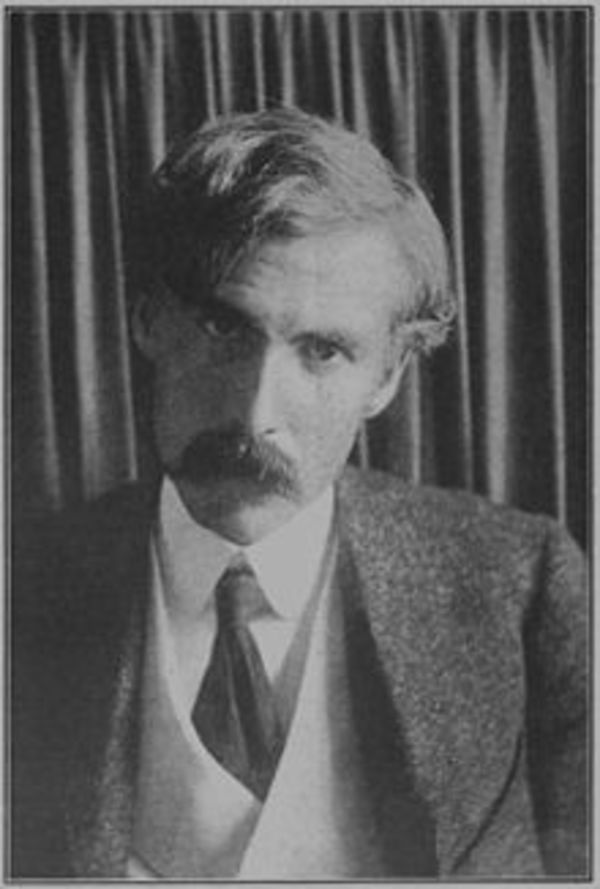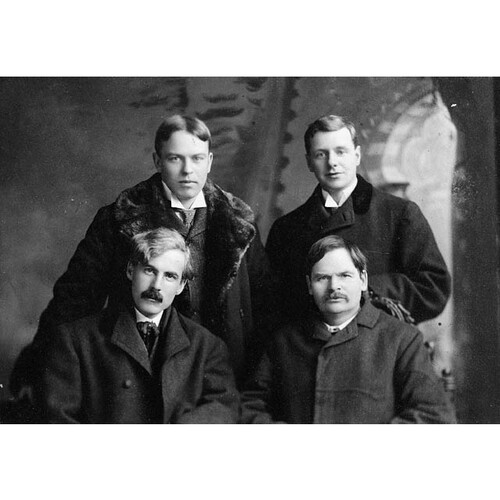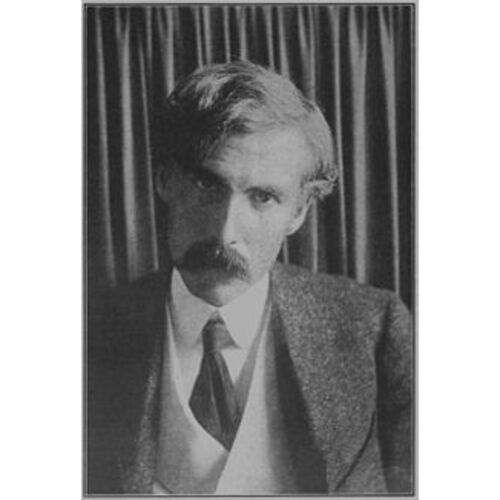
Source: Courtesy of Wikimedia Commons
DUNCAN, NORMAN McLEAN, journalist, educator, and author; b. 3 July 1871 in North Norwich Township, Ont., son of Robert Augustus Duncan and Susan Hawley; d. unmarried 18 Oct. 1916 in Fredonia; N.Y.
Norman Duncan spent his early life in Brantford, Fergus, and Mitchell, Ont. From 1891 to 1895 he attended the University of Toronto, where he was a classmate of William Lyon Mackenzie King*. After a brief stint as a reporter with the Auburn Bulletin (Auburn, N.Y.), in 1897 he joined the staff of the Evening Post (New York) as a news reporter, and he later became a feature writer. The Syrian immigrants of lower Manhattan inspired his first significant writing, a series of articles and stories, six of which were published in 1900 as The soul of the street.
In 1900 Duncan travelled to Newfoundland, his intention being to visit the medical missionary Wilfred Thomason Grenfell* in St Anthony. Forced to abandon this plan because of seasickness, he spent the summer on the island of Exploits. During this first of several trips to the isolated northeast coast of Newfoundland, Duncan found the subject matter for dozens of periodical articles and several works of fiction. In 1903 he published The way of the sea, a collection of ten short stories which show the heroism and indomitable spirit of a people incessantly struggling against the treachery and power of the sea. He finally met Grenfell in 1903, and as a result of time spent with him on the Labrador coast that summer he published Doctor Luke of the Labrador (1904) and Dr. Grenfell’s parish (1905), both inspired by Grenfell’s work.
From 1902 to 1906 Duncan lived in Washington, Pa, and taught rhetoric and oratory at Washington and Jefferson College. In 1906 he moved to Lawrence, Kans., following his brother Robert Kennedy, who had joined the faculty of the University of Kansas. Over the next seven years he travelled to the Middle East, the lumber camps of northern Minnesota, and Australia, each trip resulting in a book: Going down from Jerusalem (1909), a travelogue with illustrations by the young Lawren Stewart Harris*, who accompanied him on the journey; The measure of a man (1911), a novel inspired by the work of the Reverend Francis Higgins among the lumberjacks of northern Minnesota; and another travelogue, Australian byways (1915). In 1910 the University of Pittsburgh conferred on Duncan an honorary d.litt. Following the death of Robert in 1914, Duncan resided with his younger brother Ernest, first in Willoughby, Ohio, and later in Fredonia, N.Y., where he was living at the time of his death.
Norman Duncan was a prolific writer, having published over 140 periodical articles as well as 20 books. The peak of his literary achievement came early with The way of the sea, a book widely reviewed after its publication and the object of continued attention from Canadian literary historians and critics. A significant contribution to Newfoundland literature, The way of the sea is the first work of fiction that endeavours to delineate a uniquely Newfoundland character. While he did continue to write short stories about Newfoundland until his death, Duncan never surpassed the level of intensity and the perfection of form that he achieved in this collection.
His best-known novel, Doctor Luke of the Labrador, shares the basic flaw of all his longer works of fiction, a lack of unity resulting from his practice of piecing together, sometimes rather carelessly, previously published material. His best portrayal of Labrador is in Dr. Grenfell’s parish, which in spite of its biased glorification of Grenfell contains a fine documentary of life in northern Newfoundland and coastal Labrador at the turn of the century.
A comprehensive bibliography of Norman McLean Duncan’s publications is available in the author’s dissertation, “Norman Duncan: a critical biography” (phd thesis, Memorial Univ. of Nfld, St John’s, 1987). A complete list of his Newfoundland writings appears in her book, The frayed edge: Norman Duncan’s Newfoundland (St John’s, 1992).
Duncan’s monographs include The soul of the street: correlated stories of the New York Syrian quarter (New York, 1900); The way of the sea (New York, 1903, and various other printings and editions; the original 1903 text has been reprinted twice, at Freeport, N.Y., 1970, and Ottawa, 1982); Doctor Luke of the Labrador (New York, 1904; repr. 1934); Dr. Grenfell’s parish; the deep sea fishermen (New York, 1905); The adventures of Billy Topsail: a story for boys (New York, 1906); The cruise of the “Shining Light” (New York and London, 1907; also issued at Toronto, 1907); Going down from Jerusalem: the narrative of a sentimental traveller (New York, 1909); The measure of a man: a tale of the big woods (New York, 1911); and Australian byways: the narrative of a sentimental traveller (New York and London, 1915). An anthology of his short fiction edited by John Coldwell Adams has been published as Selected stories of Norman Duncan (Ottawa, 1988); biographical information on Duncan is provided in Adams’s introduction, pp.1–12.
Centre for Newfoundland Studies, Memorial Univ. of Nfld (St John’s), Arch., coll–67 (Norman Duncan papers). Canadian men and women of the time (Morgan; 1912). Patrick O’Flaherty, The Rock observed: studies in the literature of Newfoundland (Toronto, 1979). Wallace, Macmillan dict.
Cite This Article
Elizabeth Miller, “DUNCAN, NORMAN McLEAN,” in Dictionary of Canadian Biography, vol. 14, University of Toronto/Université Laval, 2003–, accessed February 16, 2026, https://www.biographi.ca/en/bio/duncan_norman_mclean_14E.html.
The citation above shows the format for footnotes and endnotes according to the Chicago manual of style (16th edition). Information to be used in other citation formats:
| Permalink: | https://www.biographi.ca/en/bio/duncan_norman_mclean_14E.html |
| Author of Article: | Elizabeth Miller |
| Title of Article: | DUNCAN, NORMAN McLEAN |
| Publication Name: | Dictionary of Canadian Biography, vol. 14 |
| Publisher: | University of Toronto/Université Laval |
| Year of publication: | 1998 |
| Year of revision: | 1998 |
| Access Date: | February 16, 2026 |




